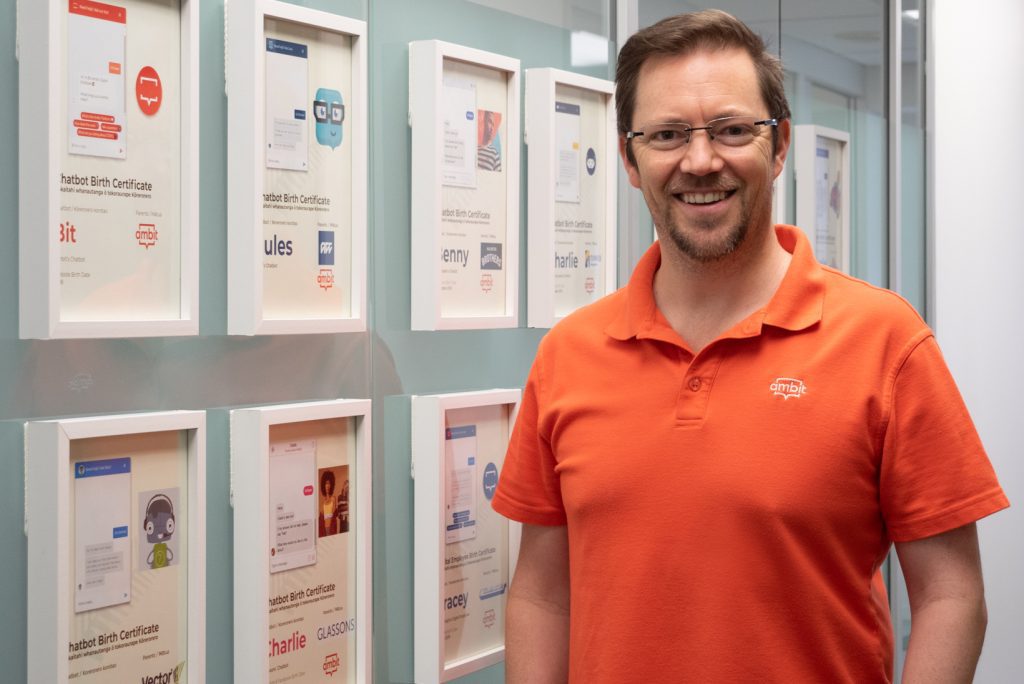July 3, 2023
The soaring popularity of ChatGPT has failed to persuade organisations in New Zealand from blindly embracing artificial intelligence (AI), with the enterprise standing firm in the pursuit of secure and private alternatives.
Behind local and global headlines is a boardroom determination to embrace generative AI on grounds acceptable to business with industry guardrails required to accelerate widespread Kiwi adoption.
“Let’s be real here,” stated Tim Warren, Co-Founder and CEO of Ambit, an Auckland-based conversational AI platform. “ChatGPT is an awesome tool that has woken the world up to the potential of generative AI but it can’t be directly used in production.
“Just as a high pressure hose is a powerful tool when used with purpose – and can be entertainingly random at times – AI needs guardrails and controls.”

Created by OpenAI – and backed by Microsoft – ChatGPT is expected to launch an enterprise version “in the coming months” in response widespread user privacy concerns. In New Zealand, the Ministry of Business, Innovation and Employment has already banned employees from using ChatGPT, citing data and privacy risks.
Under the banner of ChatGPT Business, the subscription is aimed at professionals who require “more control” over data as well as enterprise customers seeking to better manage end-users.
“ChatGPT Business will follow our API’s data usage policies, which means that end users’ data won’t be used to train our models by default,” OpenAI shared via a blog post in April.
ChatGPT aside, Warren said Ambit has been utilising large language model (LLM) generative AI for at least 18 months with enterprise customers in New Zealand. Think of this as GPT (generative pre-trained transformers) minus the ‘Chat’.
“Behind the headlines, there are many companies making exciting progress within their industry or vertical,” he added. “The key use cases are with enterprises who want secure and private GPT style access for generating internal and external content. We are working with a law firm which does not want their legal opinions available in the public cloud.”
A similar scenario is also taking place in retail, with one customer seeking to access surface shopper preferences from years of repeat purchases. But rather than using public models, Warren said this company intends to create an internal finely tuned model to ensure that customer data is safe and the outputs are accurate.
“Yes, ChatGPT will have enormously helped awareness and ultimately adoption,” Warren acknowledged. “Now it’s up to organisations to double down on that awareness with meaningful projects to gain business value.”
Strategy not periphery
Ambit’s AI platform is used by Kiwi brands such as Laybuy, Tower Insurance and Southern Cross Travel Insurance, as well as Vector, New Zealand Post and Accident Compensation Corporation (ACC).
With a user base spanning key market sectors – such as financial services, retail, energy and utilities, contact centre and logistics among others – Warren is well-placed to assess early adoption of AI in New Zealand.
“Kiwi organisations continue to take a largely ‘wait and see’ approach to AI, experimenting but with relatively little governance, structure and process,” he said. “There is a lot of excitement – dare I say hype – in ad hoc areas around various businesses but this is unstructured and being driven from the periphery rather than strategically.”
While AI use cases currently vary, the most common areas tackled in New Zealand are:
“The number one challenge is the lack of understanding about how fast this area is moving,” Warren noted.
In other words, Warren said organisations guided by annual strategy cycles are already “very far behind” with boardroom input required to maximise the potential.
“Because the technology is evolving so fast, understanding costs and relative outcomes is not easy for companies to do in-house and this leads to a high degree of experimentation without clear business outcomes,” he cautioned.

If AI projects are approached in a well structured manner then any potential downsides can be identified and managed, providing boundaries are put in place, added Warren.
“If you have analysts randomly putting customer data into ChatGPT, this introduces all kinds of risks as private information is pushed into a publicly available AI,” he warned.
In response, Warren said Kiwi companies must create a boardroom backed framework at the executive level to ensure the organisation is not only prepared for AI but capable of “acting fast” if market dynamics change. This includes adding key risks from AI and GPT to the risk register and identifying what tasks external AI should and should not be asked to do.
“We are increasingly asked to advise companies with a plan before they put their data into external services,” he explained. “Is this recorded? Is it protected? Is it allowed? Have they assigned responsibilities to monitoring and setting guidelines? There’s a lot here and it’s best companies get ahead of this.”
Growing through GPT
In the months ahead, Ambit is accelerating expansion beyond Kiwi borders with the retail sector in Australia cited as a “new growth region” for the business, which was founded in 2016.
“There is a huge rush to deploy GPT-powered tech like ours so we are well placed to be the experienced partner of choice,” Warren added. “GPT opens doors that were previously inaccessible, so we want to be at the front of the queue to help these clients.”
While “confusing economic times” remains a headwind for any growth-oriented business, Warren viewed 2023 as an “incredible time” to be starting a company in New Zealand.
His advice? “Get out of your comfort zone as early as possible”.
That includes searching outside New Zealand for capital and customers, in addition to focusing on a “small and defined” market segment from the outset.
“Founder life demands grit and mental fortitude on an ongoing basis,” he admitted. “I’ve never found it easy yet success is sometimes described as luck, so it’s a strange and sometimes lonely journey. But I’m in the middle of a race so don’t feel ready to look back yet.”
Inform your opinion with executive guidance, in-depth analysis and business commentary.